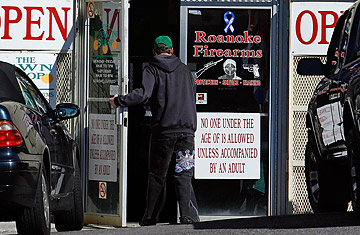
A customer enters Roanoke Firearms in Roanoke, Virginia, April 17, 2007. Cho Seung-Hui bought a Glock 19 handgun from the shop 36 days before going on a shooting rampage that left 33 people dead.
The first significant federal gun control law, passed back in 1968 in reaction to the Kennedy assassination five years earlier, prohibited anyone involuntarily committed to a mental institution from buying firearms. Forty years later, that still remains the standard for most federal and state gun buying restrictions. The problem is that involuntary commitment was the norm four decades ago; family members, doctors and law enforcement could easily commit troubled souls to psychiatric hospitals with scant paperwork and little concern for individual or privacy rights. When Cho agreed to a voluntary committal to a psychiatric facility in 2005, he was benefiting from the advocacy of civil libertarians who had worked to give mental health patients a say in their treatment.
404 Not Found
Now at least one prominent gun rights advocate admits that the 1968 gun-buying mental health standard might give people like Cho too much benefit of the doubt. Stephen P. Halbrook, a constitutional lawyer who recently was involved in the appeals court victory for gun rights advocates challenging the Washington, D.C., handgun prohibition law, thinks the time may have come for a reconsideration of those 1968 guidelines. "I'm not going to advocate new restrictions, with the exception that it should be at least a consideration that people with disabilities who have been adjudicated to be mentally ill and a danger to oneself or others should be included," Halbrook says. The National Rifle Association, whom Halbrook has represented in cases before the Supreme Court, could not be reached for comment.
Halbrook cautions that any new restriction should not be too broadly drawn to include all voluntary commitments, since some individuals seek help after the loss of a loved one or traumatic event in their lives, and there should be a recognition that seeking help is valuable "first step on the road to recovery" for any mental illness. But he said there can be consensus on developing an amendment to the federal standards to address cases like Cho's, provided the voluntary commitment involves a doctor and judge and it is concluded the person is a danger to himself or others. (A magistrate did initially judge Cho to be mentally ill, and also either a threat to himself or others or unable to care for himself. But it was only as part of a probable cause determination to hold him briefly at a psychiatric facility until his formal hearing — where he agreed to the voluntary treatment — rather than a binding legal ruling.)
"We are at a very interesting intersection of these issues," Mary Zdanowicz, director of the Arlington, Virginia-based Treatment Advocacy Center, said. From the "easy" commitment laws in the first half of the 20th century, the pendulum has swung over the past couple of decades to the point that it has been increasingly more difficult to get a troubled individual committed involuntarily, she said. Now, she argues, the pendulum is starting to swing back in the other direction. "From my perspective, it's a good thing," Zdanowicz said.
The Advocacy Center has been pressing for that "equilibrium" in state laws so that troubled individuals can be ordered into treatment, particularly when they fail to take their medications or exhibit potential for violence or self-destruction. Zdanowicz believes that some states rely on arcane law enforcement language to set out standards for involuntary commitment — in Virginia, for instance, the person must be adjudicated to be an "imminent danger" to himself or others. The center endorses more flexible language found in states like Arkansas and Wisconsin, where a judge is allowed to determine if there is a "reasonable probability" someone will harm themselves or others.
Long before this week's horrifying events at Virginia Tech, the rewriting of Virginia's commitment laws was already a major focus of a yearlong study of the state's mental health laws launched last fall by Leroy R. Hassell Sr., the chief justice of the Virginia State Supreme Court. Zdanowicz, who serves on the task force, said the chief justice had become concerned that the criminal justice system was, in effect, becoming the state's mental health care system, where jails are poor substitutes for failing and too few mental health care facilities. The Cho shootings will bring even closer scrutiny of the imminent danger language in the state's assisted treatment laws, according to Zdanowicz. And retired Virginia state police superintendent Col. W. Gerald Massengill, who will chair the commission named by Virginia Gov. Timothy Kaine to investigate the shootings, has already said the state's mental health laws will be one focus of its investigation.
As the 2008 Presidential campaign gets off to a fast, early start, the notion of tweaking the mental health laws rather than pushing gun control legislation in vain has its obvious appeal, particularly among centrist Democrats who are hesitant to alienate the gun lobby in key battleground states. In the wake of the Virginia Tech massacre none other than former President Bill Clinton, who in the past has blamed some national Democratic party losses on the gun control debate, has added his voice to a chorus of others this week calling for a different approach. When Larry King asked Clinton Thursday about gun control and Cho's rampage, he responded: "It wasn't really the gun laws." He added: "This case gives us the obligation to look at how our mental health system works." If the Virginia Tech massacre has any lasting legacy, perhaps it will be in getting both sides of the gun control debate to live up to that obligation.
- with reporting by Michael Lindenberger/Blacksburg
